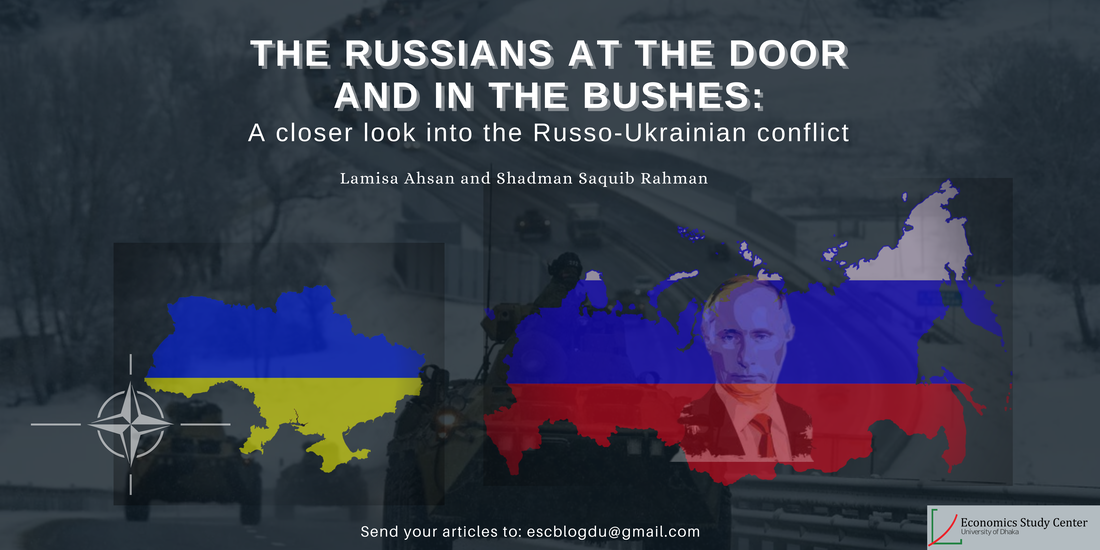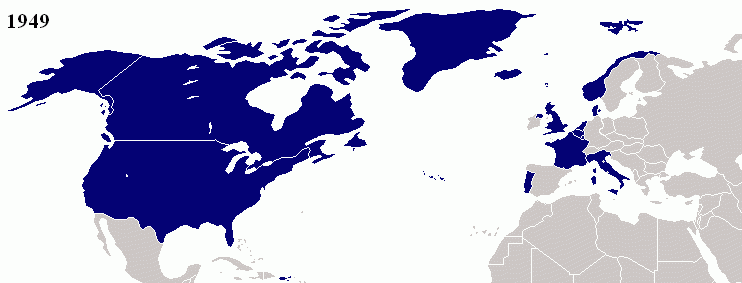ECONOMICS STUDY CENTER, UNIVERSITY OF DHAKA
Lamisa Ahsan and Shadman Saquib RahmanCover design: Mubasher Haider ChowdhuryA tense situation in Ukraine has been brewing for the worse in the past few weeks. This is due to the build-up of around 145,000 Russian soldiers around its borders, complete with tanks, artillery, and air support. As the fear of invasion hangs in the air in Kyiv, Moscow has denied any plans to invade as it carries out joint military drills with Belarus in the north of Ukraine, while bolstering its military presence on its border with Ukraine. However, interestingly, the Kremlin has also placed a list of demands expressing 'security concerns,' including a guarantee that Ukraine will never join NATO and the withdrawal of NATO troops and missiles from Eastern Europe. Source: The Economist In response, while the U.S. did express that it was offering a "diplomatic path" to Russia, it has rejected Russia's demand to bar Ukraine from joining NATO if it wanted to in accordance with NATO's 'open-door policy.' Simultaneously, the US, along with some of its Western allies, has sent "lethal" military aid (except for Germany, which sent 5000 helmets instead) to Ukraine along with the deployment of an additional 3000 troops in Eastern Europe to support its NATO allies. While U.S. President Joe Biden has warned of a "distinct possibility" of a Russian invasion this February, Ukrainian President Volodymyr Zelensky maintained that "We don't need panic." Evidently, with the Chinese President Xi Jinping recently expressing solidarity with Russian President Vladimir Putin by issuing a joint statement opposing NATO expansion on one hand, and Turkey offering to hold a peace summit between Moscow and Kyiv on the other hand, the trajectory of the conflict remains a mystery. However, by exploring history, geopolitics, and Putin's intentions, we can assess the likelihood of a Russian invasion and all-out war and its consequences. Let's take a closer look at what reasons Russia would have for wanting to invade Ukraine. An Old Flame In August 1991, Ukraine gained independence from the Soviet Union and gradually transitioned to a market economy. Since then, however, tensions between Ukraine and Russia have existed due to its ancient links to Russia and new allegiances to Western nations. While Russia lost control of 14 former republics after the collapse of the Soviet Union, the loss of Ukraine was the hardest pill to swallow. In fact, with the two countries having been linked since the 9th century and the residents speaking closely related languages, Russians feel a strong bond with the Ukrainians. Russian President Vladimir Putin even went so far as to say that Russians and Ukrainians were one people who shared a common historical and spiritual place. Ghosts of the Iron Curtain The expansion of NATO over time. Source: Wikimedia Commons The North Atlantic Treaty Organization (NATO) has slowly expanded eastwards, incorporating former Soviet-bloc countries since the collapse of the USSR, ending the Cold War. This was and is perceived as a dangerous incursion on Russia's frontiers. As a result, Russia has historically tried to meddle in the affairs of former Soviet republics like Belarus, Estonia, Ukraine, Kazakhstan, etc., to check the influence of the West. In 2014, Russia invaded and seized the Crimean Peninsula from Ukraine in February and March 2014. This incident occurred in the aftermath of the Dignity Revolution (where the Ukrainians ousted their pro-Russian president when his administration refused to sign an association agreement with the E.U.) and is part of the larger Russo-Ukrainian war. Even though Ukraine is not a member of NATO yet, after ousting a pro-Russian president in 2014 and later performing joint military drills with NATO, it may become one soon to combat Russian hegemony. Many former Soviet republics like Latvia, Lithuania, and Estonia have already been NATO members for a while now. Vladimir Putin has suggested that Ukraine may be used as a launchpad for NATO missiles aimed towards Russia if it is granted membership. Moreover, given the flat terrain of Ukraine, Russia would have to spend billions on military expenditure to bolster its western border if Ukraine becomes a part of NATO. Residents of Ukraine's Donbas region live in constant fear of a Russian incursion and have had to struggle with eight years of hostilities and conflict near the border. Donbas is also considered to be key to Vladimir Putin's gambit in Ukraine. Putin’s powerplay As an authoritarian leader tolerating no domestic opposition, revolutions in neighboring countries set a precedent for protests in Russia (pro-West vision). Since Ukraine and Russia are culturally similar, if it flourishes through democracy, it may challenge the status quo in Russia through calls for democracy. As an admirer of the former Soviet Union, Putin understandably considers Ukraine as unfinished business in the aftermath of the invasion of Crimea. What will happen if Russian troops invade Ukraine? Any war would indeed be a disaster for Europe, resulting in a large number of refugees and a large amount of bloodshed. With Russian troops already in Belarus, there are fears that they could launch an attack on the Ukrainian capital, Kyiv, from the north via Belarus. In that regard, Ukrainian President Zelensky said, "I openly say: this will not be a war between Ukraine and Russia - this will be a war in Europe. Full-scale war because no one will give up their territories and people anymore". Germany may be willing to stop the opening of the Nord Stream 2 gas pipeline to Russia, according to the president of the EU, which may cause energy costs in Europe to rise, although German chancellor Olaf Scholz has been conspicuously silent on the issue. The United States and its allies have warned Russia with severe economic sanctions intended at crippling its economy and weakening its technology and defense industries. Furthermore, the EU has declared that if Russia creates a puppet regime in Ukraine, it will face some serious economic consequences. As for Ukraine, should Russia attack, NATO officials fear that the Russian forces will advance from the north through Belarus, east from the Donbas region, and south from Crimea in multiple phases to force diplomatic concessions one way or the other, including the federalization of Ukrainian into smaller autonomous regions undermining Kyiv's centralized authority. Will he or won’t he? To begin with, if Putin intended to invade, he would have done so by now. Because, through time, western solidarity has become stronger. As a result, the sanction's reach has expanded, and the Ukrainian military has ramped up its readiness. The U.S. has already imposed penalties on Russia for annexing Crimea, and legislation in the Senate is pending to halt construction of the Nord Stream 2 gas pipeline between Russia and Germany. Secondly, Putin has undertaken little to no steps to prepare the Russian people for a full-fledged war in Ukraine through its media about its intentions in Ukraine. However, American intelligence has reported a surge in disinformation from Russian-aligned social media accounts like R.T. and Sputnik and the Twitter of Russian officials accusing western Ukrainians of Nazism, among other things. The Russians desire amicable relations with their Ukrainian neighbors as any invasion would very certainly lead to severe economic consequences. In a country where the GDP has already fallen by 35% since 2013, it would be wise to warn the Russian people about such a prospect. Furthermore, Ukraine has already drifted away from Russia’s influence after the annexation of Crimea, and a similar invasion in Donbas is likely to make things worse On the other hand, there are plenty of reasons why Russian forces may actually invade Ukraine, including the fact that this may be the last opportunity for Putin to keep Ukraine under its thumb. Ukraine has already started to lean Westwards after the annexation of Crimea. Another reason pointing to the likelihood of invasion is the continued buildup of fully-armed troops carrying out military exercises all around the eastern and southern borders of Ukraine. Russian forces around Ukraine. Source: CNN Furthermore, the precedence set by the annexation of Crimea where Putin faced similar risks of international sanctions and condemnation and yet still carried on anyway indicates that Putin may decide to prioritize the geopolitical advantage of invading Ukraine (especially the Donbas region) over all else. Finally, Chinese support for Russia both ideologically and at the U.N. Security Council may further isolate Putin from any significant U.N. response to a potential invasion. Not to mention, the U.S. has recently revealed Russia's alleged plans to stage a phony video and use it as a pretext for the invasion of Ukraine. Will history repeat itself? Let us digress a little and make some connections that reveal an interesting pattern and what it may indicate. If we look at the price of crude oil, for example, there is a strong correlation between rising fuel prices and Moscow's propensity to enforce the will aggressively beyond its frontiers. Numerically, oil prices were at historically high levels during Russia's two military attacks on former Soviet neighbors, the August 2008 conflict in Georgia and the aforementioned annexation of Crimea and the later involvement in the Donbas area from Ukraine ($125 and $102.57, respectively, for global benchmark Brent crude). Similarly, oil prices are currently on the rise, having jumped to seven-year highs on Friday, with U.S. benchmark West Texas Intermediate crude hitting $91 a barrel and Brent crude surpassing $92 a barrel. “In each case, war was preceded by several years of high oil prices,” told Bob McNally, the CEO of Rapidan Energy Group. With Russia being the world's third-largest producer of crude oil, rising oil prices may shield the Kremlin from the fallout of economic sanctions and isolation from the West in the aftermath of a potential invasion of Ukraine. Finally, if we were to grasp at straws, historically, in 2008, Russia invaded Georgia during the Summer Olympics in Beijing following a series of cyberattacks. Interestingly enough, the winter Olympics is set to be held in Beijing on February 4 of this year, with some military experts speculating that if Russia does invade, it will do so following cyber-attacks. Although it is hard to say what exactly will happen, the patterns are there for you to make up your own mind. References:
0 Comments
Leave a Reply. |
Send your articles to: |






